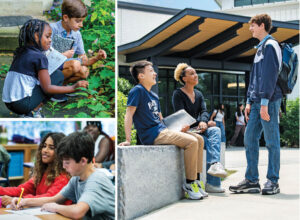Today’s most successful learners know how to leverage a variety of tools and resources, tapping into a global network of information, ideas and people.
Collaboration, communication, content creation and media literacy are cornerstones of a modern education. In our resource rich world, schools have a responsibility to model powerful 21st-century learning.
At Abington Friends School we embrace new and exciting possibilities fueled by technology, while also maintaining our rich history of intentional, reflective learning. As a community we discuss a balanced approach to using technology for learning, socializing and connecting with people and ideas. We help adults and children manage their time and engagement with devices and with each other.
Building on many years of best practice and thoughtful tech implementation, AFS has introduced a 1 to 1 laptop program for our 7th and 8th graders and Upper School students. We find this model to be the most effective in creating a culture of teaching and learning, giving students (and teachers) the tools to connect, collaborate and share with a global community of learners. Most importantly, it shifts the ownership of the learning back to the learner.
With the launch of two new makerspaces and the growing success of STEM classes and clubs, AFS continues to create opportunities for our entire community to discover passions, explore the world and create learning networks that will last a lifetime.
As a school that embraces technology and access, we are always conscious of finding a balance around technology use. We all have access to great resources and tools, but conversation, reflection and connecting to the physical community continue to be important aspects of the AFS experience.









